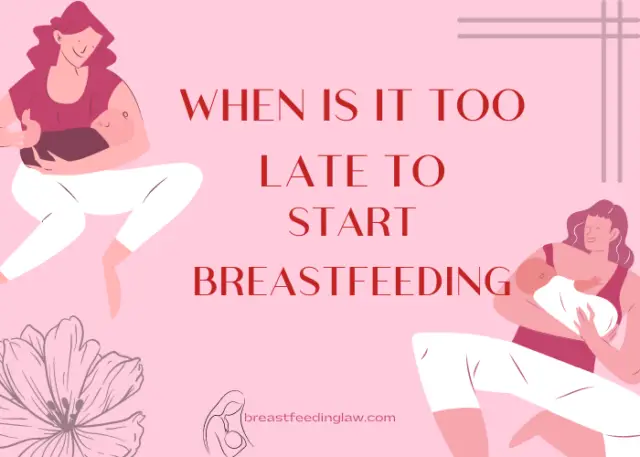Breastfeed is the right of every child being born; it consists of essential nutrients and antibodies that form their immune system. Many women aren’t successful in breastfeeding their children in the initial days of life.
However, it isn’t too late to start breastfeeding again. The World Health Organisation (WHO) insists on starting exclusive breastfeeding of newborns from the first day till six months and max till two initial years of their lives.
It is good news for women who have never had a chance to breastfeed their children for many reasons or have weaned their babies too soon. Breastfeeding isn’t an easy journey; re-lactation is even more challenging.
It requires a lot of patience and consistency. You might not get a chance to exclusively breastfeed your baby again, but you can do so partially for as long as you want. This article focuses on when you can start breastfeeding and to what age you can continue.
When Is It Too Late To Start Breastfeeding?

A new mother goes through a lot of emotions when she gives birth to her baby. She wants to take the best care of her baby and nourish the baby as much as possible.
Sometimes, a mother cannot breastfeed her child due to many unfortunate reasons. Other times, a mother doesn’t want to breastfeed her baby.
The choice is yours, but many would like to breastfeed later or wish to re-lactate your little one. The good news about breastfeeding is that it is never too late to start giving your milk to your baby to strengthen their immune system.
A lot of us already know how essential breast milk is for babies. It helps them with stringer immunity, stronger bones, and sharper brains.
According to the health experts, the best time to introduce breast milk is the first day of the baby’s life, till two years of the baby’s life.
A mother can decide to nurse the baby for as long as she wants and can start nursing whenever she wants. If you are a mother who wants to re-lactate her child or wants to begin breastfeeding later, you can do so by keeping in mind certain things.
It will never be an easy journey; however, you can adapt to a lifestyle that can lead to an abundance of milk and a well-nourished baby.
Tips For Breastfeeding Your Baby Late, How To Be Successful?

As we have mentioned earlier, motherhood is never easy, let alone breastfeeding. It can drain you emotionally and physically. If you have decided to breastfeed your baby when he is older or you want to re-lactate, know that it will be even harder.
You are going to force your body to generate milk when it has already learned to stop making milk. Here are a few steps you can follow that will make your breastfeeding journey more manageable.
Breastfeed Often
If your baby is bottle-fed or uses a pacifier, it is high time to limit the use of pacifiers and bottles.
In addition to that, look for the signs when a baby is hungry and immediately provide them breast milk so that they can satiate themselves with that. Breastfeeding often will give your brain a signal to generate more milk which increases the milk supply.
Use Breast Pump
We encourage all mothers to use breast pumps, either manual or electric. Pumping tricks your brain into producing more milk which as a result increases your milk supply. You can pump when your child isn’t hungry, and you feel like you are ready to feed the baby.
You can store that milk in the freezer and later give it to your baby in a bottle. Pumping is the best way to increase breast milk supply and is completely safe.
Stay Hydrated And Eat Well

Remember, your breast milk is 88 percent water which means hydration is what makes most of your breast milk. If you stay dehydrated, you will notice a decrease in your breast milk.
Therefore, it is essential to drink at least 11 to 12 glasses of water a day so that your breast milk can increase. In addition to that, healthy food is the key to a hefty milk supply. If you eat more, you will notice an improvement in your and your baby’s health.
FAQs
Is breastfeeding for too long dangerous for the child’s health?
Breastfeeding can never be dangerous for your child; however, the World Health Organisation recommends the new mother to exclusively breastfeed the child until six months of their lives and then partially breastfeed them till two years.
There is no harm in breastfeeding your baby for extended years, as the research suggests. However, it may have some psychological effect on the mother or the baby, but these studies aren’t yet backed by evidence.
Why is breastfeeding essential?
Many mothers refuse to breastfeed their babies; however, there are many health benefits your newborns and toddlers can get from the mother’s milk.
How to increase breastmilk supply?
Every mother wants to nourish their babies with a hefty breast milk supply. However, some mothers might find their milk supply isn’t enough. There are effective ways to increase your breast milk.
For instance, you can use pills to increase the milk supply. Moreover, take a healthy diet, incorporate oatmeal, seaweed, and breast milk, increasing herbs in your diet.
Lastly, keep hydrated and breastfeed often; this will have a noticeable increase in your milk supply.
Final Thoughts
Every mother on planet earth wants to nourish their newborns with their breast milk for as much time as possible. Some women cannot do so due to many understandable reasons.
They shouldn’t be worried because it is never too late to start breastfeeding or re-lactating your child again.
Your breast milk is liquid gold for your child, so you shouldn’t feel shy to re-lactate your child.
It will help the baby to build strong immunity, a sharp brain, and healthy bones. It can be harder for you to breastfeed later in life, but it isn’t impossible to try again.









